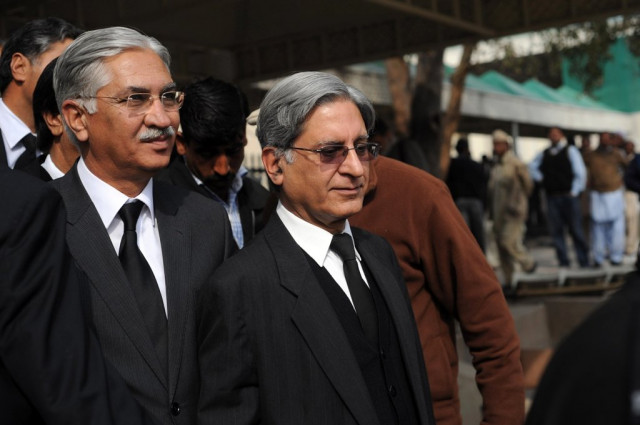Parliament should make decisions, not APCs: opposition
Aitzaz says discussion in the house is imperative

Chaudhry Aitzaz Ahsan. PHOTO: AFP
The opposition in the upper house of parliament on Tuesday advised the government to avoid making decisions out of the legislative assembly and, instead, make them on the floor.
Referring to the rift between Iran and Saudi Arabia, the Senate members said that even if the decisions concern defusing tensions and mediating between two Muslim countries, they should not be made by individuals.

Opposition leader Aitzaz Ahsan of the Pakistan Peoples Party (PPP) wished luck to Prime Minister Nawaz Sharif for his Saudi-Iran fence-mending mission, but added that decisions should be made in the house.
His remarks came when he was asked for his opinion on holding a discussion on concerns regarding the western route of the China-Pakistan Economic Corridor (CPEC) after Raja Zafarul Haq of the ruling Pakistan Muslim League-Nawaz opposed the move, saying the issue had been settled in a recent all-party conference (APC).
“Decisions are made, but it is imperative to bring them in the house for discussion,” said Ahsan, adding that decisions were being made by two men — in an obvious reference to PM Nawaz and Chief of Army Staff General Raheel Sharif. “Decisions should be made on the floor of the house and not by individuals.”
The PPP senator supported the call for holding a discussion on an admitted adjournment motion on the CPEC, saying that it would help the government present its point of view and clear misunderstandings.
Senator Mohsin Leghari, who presided over the proceedings in the absence of Chairman Raza Rabbani, also advised the government against ignoring parliament. “Parliament is rendered insignificant when decisions are taken in APCs.”
During the discussion, senators expressed a range of concerns and shared proposals, but they were unanimous in demanding that the premier be in the driving seat on CPEC-related projects.
PPP Senator Osman Saifullah said the trade corridor was a once-in-a-lifetime opportunity. “We should ensure that the entire country benefits from it, instead of any particular region.”
National Party’s Mir Kabeer Muhammad Shahi complained that the MPs were kept in the dark and were shown new designs and maps every time they made inquiries about the CPEC.
He asked the government to ensure there are no demographic changes in Gwadar and to inform the house about the estimated income of the province once the port becomes operational.
Usman Kakar of the Pashtunkhwa Milli Awami Party said: “We respect the decisions of the APC, but issues should be discussed in parliament. Lack of confidence is the biggest issue.”
PPP’s Sassui Palijo pointed out that the discussion on the trade corridor should have taken place at the Council of Common Interests.
Published in The Express Tribune, January 20th, 2016.



















COMMENTS
Comments are moderated and generally will be posted if they are on-topic and not abusive.
For more information, please see our Comments FAQ